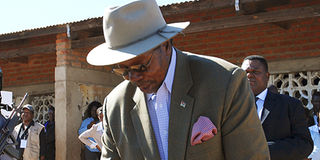Premium
Opposition rejects early Malawi poll results

Malawi President Bingu wa Mutharika casts his vote at his hometown of Goliati in Thyolo district, 30km (18.6 miles) east of the commercial capital Blantyre, May 19 2009. He took a strong lead on Wednesday in an election seen as a test of political stability in one of the world's fastest growing economies. Photo/REUTERS
LILONGWE, Wednesday
Malawi’s opposition today rejected early election results showing the president had a big lead in their stronghold. The opposition stance raises doubts over the vote in the poor but fast-growing African country.
The election has tested political stability after a drawn-out power struggle between President Bingu wa Mutharika and former President Bakili Muluzi, himself excluded from the contest. The Malawi Congress Party, headed by opposition presidential candidate John Tembo, demanded a halt to vote counting in Central Province due to irregularities.
Open envelopes
It said those included ballots being delivered to counting stations in open envelopes. “Malawi Congress Party therefore rejects the results and will not accept the results if Dr Bingu wa Mutharika and the Democratic Progressive Party are declared winners,” it said in a statement.
Central Province is an opposition stronghold, but the president took an early lead in the count there with 845,000 votes compared to 254,000 for Mr Tembo, according to a private radio station accredited to release results. The electoral commission said complaints would only be dealt with after all votes had been received.
A flawed election in Malawi would be another bad sign for democracy in Africa after polls in Kenya and Zimbabwe, Malawi’s neighbour, unleashed violence in 2008. The president based his re-election campaign on his record of turning Malawi into a net food exporter and delivering three years of growth above 7 per cent in the country of 13 million where annual gross domestic product is only $313 per capita.
But he faced an opposition challenge united behind long-time opposition leader Tembo, who had the support of Mr Muluzi. Malawi has the world’s second-fastest growing economy, according to the Economist Intelligence Unit. But a repeat of paralysing political upheaval could hurt efforts to attract more foreign investors.




